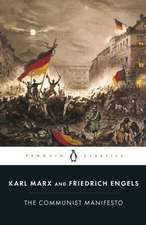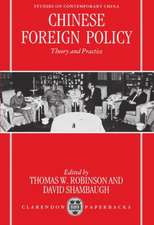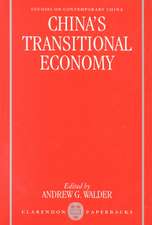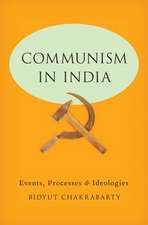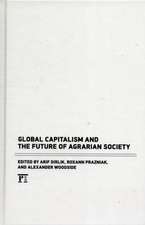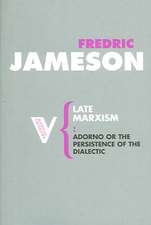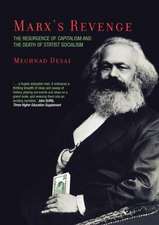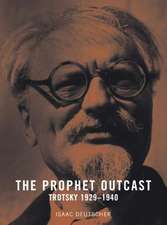The Origins of Chinese Communism
Autor Arif Dirliken Limba Engleză Paperback – 5 apr 1989
intellectuals and Marxism was virtually unknown. Three years later, however, the Communist Party of China had emerged as the unchallenged leader of the Left. Dirlik disputes long-held beliefs about the domestic origins of Chinese Communism to argue that Communist thought and organization were
brought into radical circles by the Comintern. Though Chinese radicals would not have turned to Communism unassisted, he concludes, Marxist ideology took hold easily when introduced from the outside. This book will prove indispensable to scholars of Chinese history and politics, Asian studies,
Marxism, and comparative communism.
Preț: 682.82 lei
Preț vechi: 886.78 lei
-23% Nou
Puncte Express: 1024
Preț estimativ în valută:
130.65€ • 136.78$ • 108.11£
130.65€ • 136.78$ • 108.11£
Carte tipărită la comandă
Livrare economică 07-21 aprilie
Preluare comenzi: 021 569.72.76
Specificații
ISBN-13: 9780195054545
ISBN-10: 0195054547
Pagini: 336
Ilustrații: 12 halftones
Dimensiuni: 154 x 234 x 16 mm
Greutate: 0.43 kg
Editura: Oxford University Press
Colecția OUP USA
Locul publicării:New York, United States
ISBN-10: 0195054547
Pagini: 336
Ilustrații: 12 halftones
Dimensiuni: 154 x 234 x 16 mm
Greutate: 0.43 kg
Editura: Oxford University Press
Colecția OUP USA
Locul publicării:New York, United States
Descriere
Based on a wealth of archival material released after Mao's death, this book offers a revisionist account of the introduction and triumph of Marxism in China. Dirlik shows that, in 1919, at the outset of the May Fourth Movement, anarchism was the predominant ideology among revolutionaries and intellectuals and Marxism was virtually unknown. Three years later, however, the Communist Party of China had emerged as the unchallenged leader of the Left. Dirlik disputeslong-held beliefs about the domestic origins of Chinese Communism to argue that Communist thought and organization were brought into radical circles by the Comintern. Though Chinese radicals would not have turned to Communism unassisted, he concludes, Marxist ideology took hold easily whenintroduced from the outside. This book will prove indispensable to scholars of Chinese history and politics, Asian studies, Marxism, and comparative communism.
Recenzii
'highly scholarly and original study of the beginning of Chinese Communism ... a fine example of historical analysis'Times Literary Supplement
'a scholarly reinterpretation of the introduction of Marxism to China in the second decade of this century'Times Higher Education Supplement
'This is a work of most intensive scholarship, one of the few to provide fresh information and insight into the origin and peculiarities of Chinese Communism. It is by far the finest treatment of its subject in the English language since the publication of the original edition of Harold Isaccs' book.'Al Richardson, Revolutionary History
'This is a closely written work with a wealth of new historical detail. It will need to be available for courses on the origins of the CCP, and it deserves also to be included in broader courses on the theory and practice of socialist doctrines.'Peter Ferdinand, Royal Institute of International Affairs, Political Studies, Volume XXXIX Number 1 March 1991
`stimulating book ... Dirlik's closely argued analysis is a major contribution to understanding the complexity of May Fourth radical thought and the process whereby one particular socialism ... gradually supplanted or suppressed its rivals.'History
'a scholarly reinterpretation of the introduction of Marxism to China in the second decade of this century'Times Higher Education Supplement
'This is a work of most intensive scholarship, one of the few to provide fresh information and insight into the origin and peculiarities of Chinese Communism. It is by far the finest treatment of its subject in the English language since the publication of the original edition of Harold Isaccs' book.'Al Richardson, Revolutionary History
'This is a closely written work with a wealth of new historical detail. It will need to be available for courses on the origins of the CCP, and it deserves also to be included in broader courses on the theory and practice of socialist doctrines.'Peter Ferdinand, Royal Institute of International Affairs, Political Studies, Volume XXXIX Number 1 March 1991
`stimulating book ... Dirlik's closely argued analysis is a major contribution to understanding the complexity of May Fourth radical thought and the process whereby one particular socialism ... gradually supplanted or suppressed its rivals.'History

